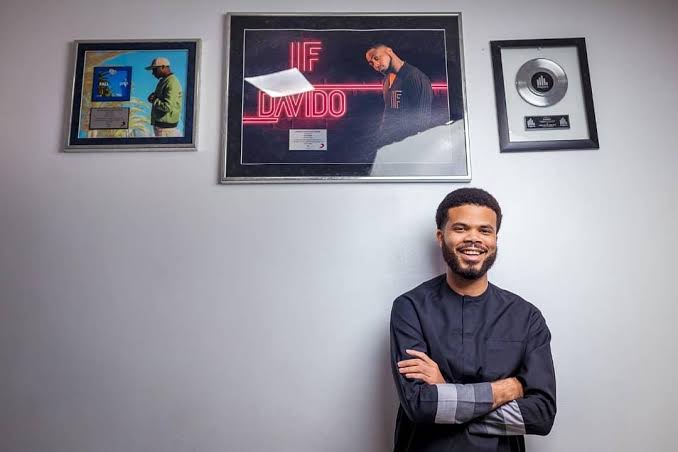In the glittering world of Afrobeats, where rhythm meets global recognition, few figures stand as quietly powerful as Asa Asika. Best known as the long-time manager of global superstar Davido, Asika has spent nearly two decades behind the scenes, not just shaping careers but building an entire ecosystem for African music to thrive on the world stage. At just 34, Asika is already a veteran. From his early days at Storm Records to co-founding The Plug and Mainland Block Party, his journey reads like a blueprint for constructing modern music empires. But his impact stretches far beyond artist management. He has redefined the mechanics of talent development, event culture, and brand partnerships within Africa’s evolving music scene.
Speaking on the Afropolitan Podcast, Asika reflected on his journey with rare candor. “At 16, I definitely didn’t think I’d be here. If anyone says they knew it would happen this way, they’re probably lying.” His rise wasn’t engineered, it was earned. With a sharp instinct for spotting untapped talent, he has signed or supported breakout stars like CKay, Oxlade, and Ayra Starr before they became household names. Yet, for Asika, raw talent is only the beginning.
YOU CAN ALSO READ: From Pain to Purpose: How Lekki Gardens CEO, Richard Nyong Never-Say-Die Attitude Made the Impossible Possible
“Everyone has some element of talent,” he said. “But I have to connect with the person on a human level. I won’t put my life into someone I don’t genuinely align with.”
For him, the music business is as much about values as it is about vision. And part of that vision is creating longevity, not just viral hits. “Every breakout hit has 50 songs before it,” he noted.
“Even CKay’s Love Nwantiti, that TikTok moment wasn’t planned. It just happened. The key was being ready to move fast when it did.” Through The Plug, which has evolved into a multi-sector enterprise spanning music, sports, events, and distribution, Asika has helped transform Afrobeats from a sound into a sustainable business model. From managing major shows to co-creating Mainland Block Party, now a staple on Nigeria’s cultural calendar, his influence is deeply felt in how Afrobeats is consumed locally and celebrated globally.
Behind the scenes, he regularly mentors young executives like Muyiwa, Donna Wan, and Sam Frank, sharing insights and encouraging growth. “I’m not afraid to learn from the youngest person in the room,” he shared. “As Africans, we need to get better at that. It’s not about doing it first, it’s about doing it better, and doing it consistently.” A defining feature of Asika’s career is his belief in partnership. The Plug, which he formed with longtime collaborators Bizzle Osikoya and DJ Obi and later expanded with Toby, was born not from a business plan but from years of shared experience and mutual trust. “Partnership is like a relationship, it has its ups and downs, but honesty and defined roles are key,” Asika said. That clarity has given him room to focus on strategic thinking while trusting his team with execution. “I know a bit of everything,” he added, “but I also know when to say, this is Bizzle’s strength, or speak to Toby. That’s the power of a real team.”
Despite working closely with many friends, Asika draws a line between real connection and professional alignment. “I’d rather have 10 real ones than be surrounded by 25 people I’m pretending are my friends in a club. I’m not that guy,” he said. His partnership with Larry Baggio, who now runs Plug Sports, reflects that ethos. Though their personalities differ, shared values and accountability have kept their bond strong. “Friendship built on accountability, that’s what matters.”
YOU CAN ALSO READ: Meet the Woman Behind Africa’s Only West African Smartcard Plant
Though the front-facing side of music management appears glamorous, Asika is honest about its emotional and physical toll. He recalled a particularly rough stretch during back-to-back arena shows in London and Paris, where logistical setbacks and lack of sleep pushed him to the edge. “I had a pounding headache. I just needed 45 minutes to switch off, but I had to power through.” On another occasion, fatigue forced him to consult his doctor. These moments reveal a side of music management rarely seen. “You’re regulating the energy of the artist, the crew, everyone. You’re the buffer. Sometimes, you’re the therapist too.”
For Asika, success isn’t about lights or loud accolades, it’s about substance. When asked if he wants his name written into history books, he shrugged. “I don’t care if my name is in a book. The people who need to know, know. That’s enough for me.” That quiet confidence underscores everything Asa Asika represents, a legacy not built on noise but on consistency, values, and real impact. In an era where overnight fame is often mistaken for success, he stands firm as a steward of the long game, building something that lasts.










